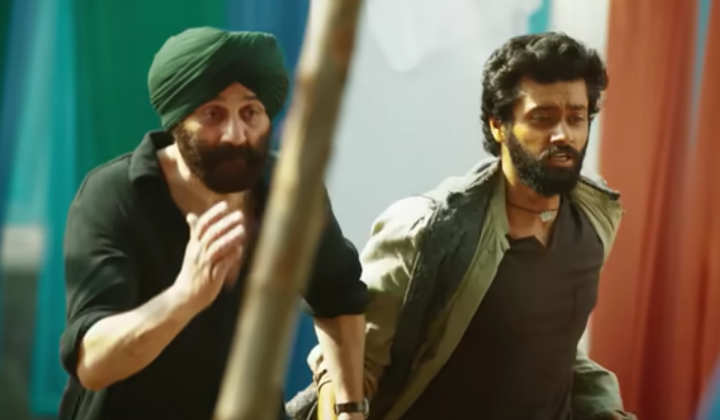For ‘Gadar’, music director Uttam Singh put together a very earthy soundtrack that did complete justice to the film. Anand Bakshi, whom the composer had collaborated on multiple films prior to that including ‘Dil To Pagal Hai’, ‘Dushman’ and ‘Hum Tum Pe Marte Hain’, wrote the lyrics. While the songs didn’t gain traction immediately, they became immensely popular as more and more people thronged to the theatres to watch the film, resulting it becoming one of the biggest hits of all time. While songs like “Main Nikla Gaddi Leke”, “Udja Kale Kawan” and “Hum Juda Ho Gaye” are played even till today, some of the underrated songs like contributed towards making the album special.
As the film’s sequel ‘Gadar 2’ is all set to hit the theatres more than two decades after the original film’s release, one realizes a lot has changed. While lyricist Anand Bakshi passed away in 2002, composer Uttam Singh doesn’t work in mainstream Hindi cinema very often. This time around, the musical reins have been handed over to composer Mithoon and lyricist Sayeed Quadri.
The album opens with “Udd Jaa Kaale Kaava”, one of the two songs from the original film that have been recreated for the sequel. The title of the song has been spelt differently from the original track (“Udja Kale Kawan”). The makers, perhaps, did this to make it clear that these were two different tracks!
When you hear Udit Narayan and Alka Yagnik’s voices in the new track, you become sure about the fact that it is, indeed, not the original track. While Udit’s voice sounds a little different now, Alka’s voice has acquired a certain kind of gravitas that makes you realize the two singers have dubbed for this track recently. Mithoon does not tamper with the original melody and also tries to ensure that the arrangements are very similar to the kind one heard in the original track. The trite-sounding “ghar aaja pardesi…” bit towards the end, though, was unnecessary and doesn’t add anything to the track.
“Udd Jaa Kaale Kaava – Climax Version”, which arrives towards the end of the album, borrows the verses written by Anand Bakshi from “Udd Ja Kaale Kawan – Search” from the original film. While the original track had Udit Narayan, Alka Yagnik and Nihar S behind the mic, this one has been rendered by Udit Narayan and Jubin Nautiyal. As the song starts, one hears Jubin humming the tune of “Udja Kale Kawan”. Till the 1:44 minute mark, the song has a distinctively haunting vibe to it. After that, the mood changes as Udit makes an entry. Jubin, who sings for the son/Utkarsh Sharma here, brings a sense of calm and innocence to the song.
The second track on the album is an original song composed by Mithoon and written by Sayeed Quadri. Sung by Arijit Singh, “Khairiyat” has a very subdued sound to it which is very different from the kind of soundscape created by Uttam Singh for ‘Gadar’. Arijit sings the song in a heartfelt manner and brings out the pathos in it to the fore effectively. Sayeed Quadri writes some simple but effective lines that represent parents’ concern for their child. The song, owing to the emotions in it, could make an impact with the visuals. However, Mithoon’s composition does not compel you to come back to it. The tune reminds one of several songs he composed in the past and therefore, does not hold much appeal.
“Main Nikla Gaddi Leke”, the boisterous and fun song from ‘Gadar’ gets presented to us in a new avatar. This time, Udit Narayan has real-life son Aditya Narayan giving him company. The original melody, along with the verses written by Anand Bakshi, have been retained. Mithoon, however, messes up with the song in a way he shouldn’t have. The musical arrangements, comprising of generic beats and loud thumps, make this sound like a badly remixed version of the original track put together by a team of amateur musicians for a wedding.
As “Dil Jhoom” arrives, you realize there is a stark difference in the soundscape created for Uttam Singh for the original and the kind of sound Mithoon has opted for ‘Gadar 2’. Despite this film being set in 1971, Mithoon has opted for a contemporary sound. The brief given to Mithoon here, perhaps, was to create a romantic track with a catchy hookline. “Dil Jhoom” sounds pleasant enough but the composition is not enticing enough for one to feel the urge to listen to it on a repeat mode.
“Sura Soi”, a traditional shabad from the Guru Granth Sahib arrives next. The tune which Mithoon creates around the shabad is just about alright and not the kind that do justice to the vividness exuded by the lines. The track, which benefits considerably from Sukhwinder Singh’s powerful vocals, could be played at a juncture in the film where an intensive fight or battle takes place.
Just like “Dil Jhoom”, the only thing that works in “Chal Tere Ishq Mein”, to some extent, is the hookline. The sensuousness which Neeti brings to the song with her vocals work for it. Her vocal prowess, in fact, is one of the very few things that holds this song together. The largely ineffective composition by Mithoon sounds like a mish-mash of many filmy qawallis one has heard in the past. Vishal Mishra leaves a mark with his ‘vocal cameo’ towards the end of the song.
The music of ‘Gadar 2’ just doesn’t meet the expectations one had from it. Even if one keeps the comparisons aside, the original songs composed by Mithoon do not have much of a weight. If the film becomes half a big a success as the original, these songs be picked up by a section of the audience. Fans of the original film and its music will have to contend themselves with the recreated versions of two songs (only one of which has been done well) from the original film.

